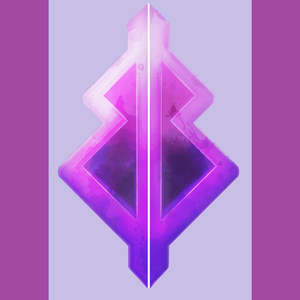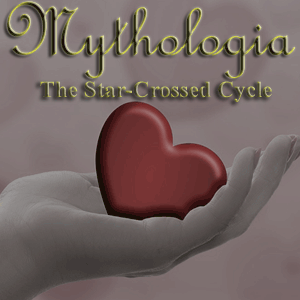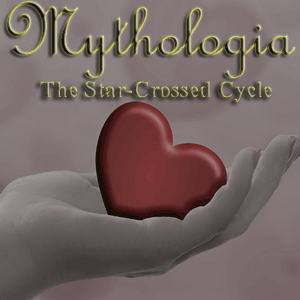The luminous lyre floated before Orpheus’ face, assailing his bleary eyes with its glow. He soon noticed, however, that it ceased to move with him as it should. The shades pulled him down, but the lyre began to rise.
Instinct moved Orpheus to grab it at once, to hold fast to the last light he might ever see. A sudden tug threatened to tear it from his grasp, but he only tightened his grip. Another tug pulled him upward, and several shades fell away. He managed to free his opposite hand from their assault and hold the lyre with both arms.
A final mighty pull from above sent Orpheus rocketing toward the surface. He was forced to shut his eyes and steel himself for the end.
He gasped for air as he felt himself emerge from the dark waters. He was dropped upon a hard wooden surface to quiver, cough, and wheeze. Recognition set in as he found his calm, and slowly, he opened his eyes. The being before him sighed its displeasure.
“What is this?” spoke the shadow. “An intruder attached to my prize?”
Orpheus looked up to see the upstretched form of a lanky, crooked creature. It stood as a man, but the horns in its forehead and the unholy sheen of its stare betrayed its otherworldly nature. It cast its hungry, burning gaze not at Orpheus, but at the golden lyre he yet held in his grasp.
It reached for the lyre, but Orpheus recoiled. “This is not your prize!” he protested.
“I am charged to tend this river, and I found this treasure therein. Thus do I claim it. By what right do you deny me?”
“By right of-”
The creature silenced Orpheus with a gesture. “The query was deceptive,” it said. “Whatever right you mean to claim, I assure you, it means nothing here. Give me my prize and get thee out. You do not belong.”
Orpheus hesitated. “I do not know the way,” he admitted.
“It is all around you,” stated the creature.
Confused, the bard looked over the wooden railing of the great seaborn vessel to see once more the waters illuminated by his lyre. Recognition settled in, and his eyes widened. “You expect me to swim?”
“I expect you to drown. If you do not, give thanks to the gods and go back to the living. If you do, rejoice; you will then belong.”
Orpheus stroked his chin thoughtfully. He measured the shadow with a searching stare. “You are the Ferryman of Souls, are you not?” he asked. “The daemon Charon?”
“I am,” the creature answered. “If you hope to stall me, introductions are a poor measure.”
“On the contrary, noble servant of Hades, I hope to secure your aid. I’ve come to-”
“To reclaim someone lost? To secure an audience with His Majesty? To challenge Chthonic beasts? Whatever answer you have, I am sure I have heard it, and I am sure I do not care.”
“I have payment!” Orpheus fumbled around through his garments until he managed to retrieve an elaborate golden piece from a concealed pocket. He presented the piece to the Ferryman. Charon leaned in to examine it.
“So you do,” spoke the daemon. “And yet, the fact remains that you do not belong. You come with none of the requisite funerary marks. Perhaps it is because you have yet to die.”
“I cannot turn back now, my lord. I have come too far.”
“I do not ask that you turn back, but I will not convey you forth.”
Orpheus’ heart sank, and he dropped his eyes to the deck. Charon sighed and tapped his long, gnarled staff against the wooden surface. He waited expectantly for Orpheus to stand and accept the fate he’d stumbled into, but the bard would not be moved.
Instead, he plucked the strings of his lyre, weaving his sorrows into song.
“I step among shades,
All my pleasures unmade
‘midst the darkness and pain of this place.
I try to endure,
But I cannot be sure
Of reward for these trials I face.”
The darkness had done nothing to dim Orpheus’ talent. The words came to him quite naturally, his mother’s blessing no less potent in that dour domain, and even Charon was given pause.
Though the tones were long and mournful, there was a brightness in the bard’s whimsical meter: a brightness seldom seen in a soul that stood on the Ferryman’s boat. Thus did the daemon stand idle and listen as Orpheus continued his song.
“What hope can I hold
While she lies below,
So unjustly stolen away?
The hope of a life
With my reclaimed wife,
My love, ‘til the end of days.”
Even the waters stilled at the sound of Orpheus’ playing. The shades within ceased their persistent moaning and whispers, enjoying in silence pleasure seldom found around the Styx. The voice that had claimed so many mortal hearts then claimed unliving hearts as well. The bard’s eyes fell shut as he plucked and strummed away. He hummed to his tune, then sang on.
“I sing a song of Hope and Life,
A song to move dead hearts.
I come in my pain
To claim my love again.
I wield but one weapon: my art.
“I sing a song of Hope and Life,
And hope finds life in me.
Twin hymns now revolve
Around my resolve
To set my beloved free.”
After several more moments of wordless strumming, Orpheus concluded his unprompted performance. He opened his eyes again to see that Charon’s stare had softened, if only slightly so.
“To reclaim someone lost, then,” spoke the daemon. He shook his head. “Is one woman truly worth so much?”
“She is everything,” Orpheus readily replied. He placed a hand over his heart and sullenly gripped his chest. “Even death cannot be as cold as the life left to me without her.”
Charon paused to intently stare at the persistent interloper on his boat. With a grunt, he tapped his staff against the wooden floor again, and the ferry lurched forward over the water.
“Continue your playing,” the Ferryman demanded. “If it quiets the souls, I will carry the song.”
Elated, Orpheus hastened to resume his performance. He hummed and strummed and swayed with his tune, and so long as he played, the spirits of the Styx kept their silence to hear him.
“I warn you, mortal,” Charon added, “Your quest will conclude in torment. There can be no other end.”
Ignoring the warning, Orpheus played on, all too eager to see Eurydice again.












Comments (0)
See all